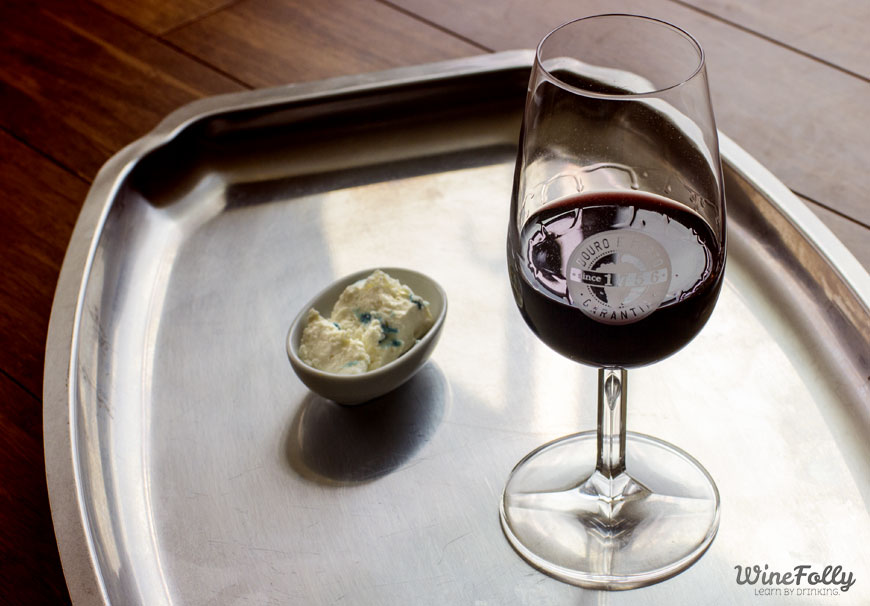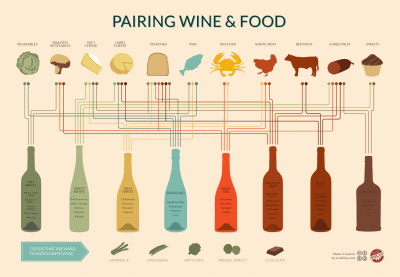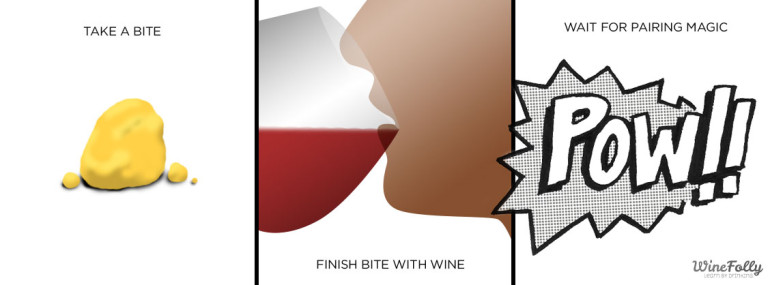
“Are you joking me?”
Rick put a morsel of this fragrant-looking blue cheese and a small Port wine glass in front of me. At the time, I’d never had what experts commonly call a “perfect pairing.” In fact, my experience with wine and dining was very removed; I worked in a wine bar that served very little food. To make matters worse I was in the midst of a diet, determined to shave off the last 5 pounds from a demoralizing office job.
He was persistent and I gave in.
A piece of Stilton with some Fonseca Ruby Port went into my mouth at the same time. Then something weird happened. The two components came together on my palate and formed something similar to the taste of cherries, cinnamon and cream. I forgot all my woes in an instant and experienced what I now refer to as a mouth-gasm.
Learn how to taste a perfect pairing, along with 6 of the most classic perfect pairings in the world.
How to Taste a Perfect Pairing
- Take a bite of food and chew.
- Sip wine with food together in your mouth.
- Wait for the magic to happen.
A “perfect pairing” occurs when both food and wine components make an even better flavor together in your mouth. Perfect pairings are rare.
Classic Perfect Pairings
Starters
Champagne and Caviar
Caviar on its own is a thick sheen of salty fish oil with the texture of micro-boba. However when you add Champagne, caviar turns into a light airy pâté that coats your mouth as each Champagne bubble explodes. The acidity in the Champagne helps dissolve weird fishy flavors.
Muscadet and Oysters
If you follow the Loire River to the sea, the vineyards closest to the ocean grow Melon de Bourgogne, the grape of Muscadet. Muscadet is similar to Chablis; it’s lean, zesty and minerally but with more salinity. A swish of Muscadet after every oyster does a very strange thing indeed; it makes the oyster taste more creamy and less “oceany.” You gotta try it.
Main Courses
Riesling and Duck à l’Orange
The French classic duck à l’orange has a bitter-sweet sauce that would overwhelm red wine. However, with an off-dry Riesling the combination is amazing. The wine acts as a sauce multiplier. It will have you reaching for your glass to get a sweet-and-sour mouth explosion with every bite.
Cabernet and Black Pepper Steak
Cabernet is a rich, high tannin wine with subtle savory aromas of black pepper. When you put a peppery earthy steak with Cabernet, the peppery aromas in the wine cling to the flavor of the steak making the wine taste more fruity. This is best tested with a very earthy Cabernet Sauvignon like a left-bank Bordeaux or a Napa Cabernet from a cool vintage.
Dessert
Sauternes and Foie Gras
This is today’s blue-chip wine and food pairing. Rich and buttery foie gras paired with a bright yellow viscous sweet honey’d wine. The magic behind this perfect pairing boils down to meat, butter and syrup. It’s like eating bacon pancakes, but for dinner.
Vintage Port and Stilton
This pairing is a bit of a surprise and it’s my very favorite. Stilton is a stinky, gooey blue cheese and vintage Port is a wine with all of wine’s primary characteristics: tannin, sweetness, alcohol and acidity. What makes it work? When you put the two components together suddenly the Port is not so cloyingly sweet and the cheese is no longer a stink-bomb. In short, they cancel each other out in your mouth. It tastes like cherries and cream.

Food and Wine Pairing Poster
Get your own food and wine pairing chart to have this information handy when you need it most.
Made in Seattle, WA.
5 Tips To Better Wine Pairings
Chefs use the concept of taste balance with food. The same rules apply to wine, but it’s also important to not overshadow the wine (especially if it’s expensive!). Keep the following tips in mind when having wine with food.
-
Having Salad? Your Wine Should have Higher Acidity
-
The Wine Should Match the Color of The Meat
-
Match Earthy Wines with Earthy Foods
-
Neutralize High Tannin Wines with Rich Meaty Foods
-
For Dessert, The Wine Should be Sweeter
Want to know more about Pairing Food and Wine? Check out these related articles:
